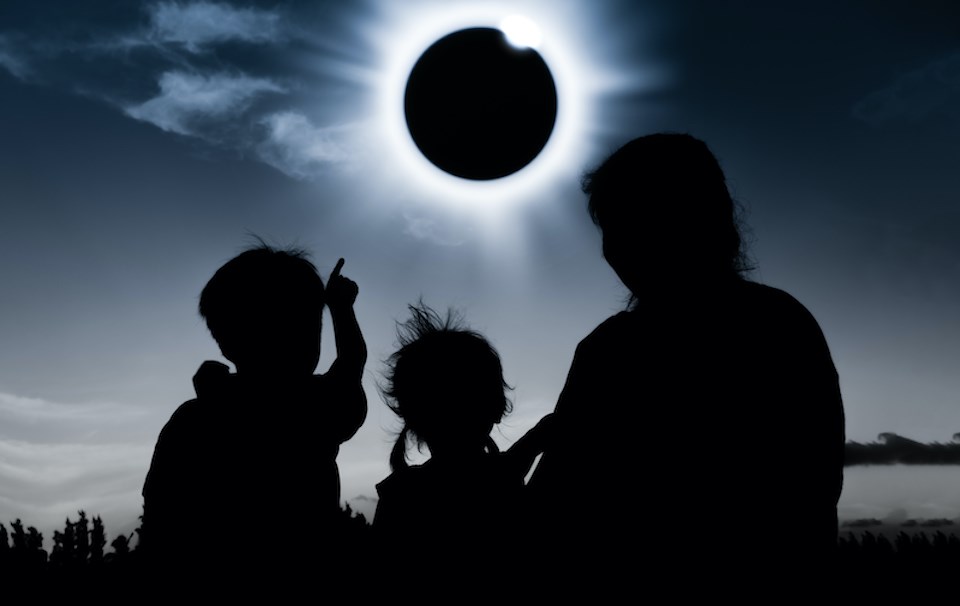Metro Â鶹´«Ã½Ó³»residents may not have an opportunity to see a total solar eclipse locally — but they won't have to travel far to see one in a couple of decades — and it could have a major impact on B.C. tourism.
UBC physics and astronomy associate professor Aaron Boley says the money spent on tourism and transportation during solar eclipses is about a billion dollars, or the equivalent of a city hosting the Super Bowl.
The impact of a solar eclipse is tangible; society grinds to a halt as the sky darkens, disrupting nearly all lifeforms on the planet, from humans to mammals to birds and beyond.
For the total solar eclipse on Monday, April 8, schools across parts of the United States and Canada shut down so that students could bear witness to the once-in-a-lifetime event. Workplaces took breaks and staff congregated outside, donning protective eyewear and craning their necks skyward to watch the celestial show unfold.
People stopped their cars, pulled over, and got out to observe the eerie daytime darkening as the moon moved between the Earth and the sun.
Traffic incidents increased during the April 2024 solar eclipse
A study published in showed more traffic fatalities during the astronomical event than on a regular day. The incidents amounted to one additional vehicle crash "every 25 minutes and one extra crash fatality every 95 minutes," totalling linked to the eclipse.
But it isn't the darkening of the sky alone that causes the uptick in incidents.
Instead, the research indicated that the incidents resulted from people visiting places they weren't familiar with driving and more traffic on the street; some people attended eclipse viewing parties and drove under the influence.
Boley says these behaviours are similar to other major events, such as a Taylor Swift concert or the Stanley Cup, that increase the number of tourists in the area and people celebrating at a specific time.
Places in the line of totality — areas where the total eclipse is visible — were hot spots for tourists looking to view the display, with hotel rooms in places such as Niagara Falls and New York selling out weeks in advance. Flight prices also increased dramatically, and restaurants and bars were unusually packed for the Monday.
"The economic impact is an indicator that [eclipses] are a big event," he adds, highlighting how groups of people were spotted rocking eclipse shirts at airports.
"A total eclipse is not something that you can ignore."
Other eclipse impacts on the Earth
In 2044, locals won't have to travel far to see an awe-inspiring celestial display.
While only a sliver of B.C. will observe the maximum display, there will be a total solar eclipse on Aug. 22, 2044. Places in B.C., such as Golden, will experience total darkness as the moon crosses in front of the summer sun.
Besides boosting tourism in the few B.C. cities and towns where it will be visible, the eclipse will have other ramifications. One of them is on local wildlife: animals believe the sun has set and act accordingly.
"Reports were made that animals got ready for bed and birds stopped chirping," Boley says, noting that the darkness lasted long enough to "trick" the creatures.
"Sometimes they are fooled in thinking the sun has set."
Solar eclipses also impact , the ionosphere. The "sudden reduction in solar radiation" reaching the Earth's atmosphere disrupts the charged particles (ions and electrons) that reflect and refract radio waves. This process can interfere with radio communications and navigation systems, according to NASA.
The celestial event can also drop the temperature.
"It feels cooler when you are in the shadow; the temperature does drop," Boley says.
But eclipses have also played an important role in human civilization, helping people understand our solar system and its place in the cosmos.
"Some of our first indications that celestial objects are round are from eclipses," he adds.
Stay up-to-date with hyperlocal forecasts across 50 neighbourhoods in the Lower Mainland with V.I.A.'s Weatherhood.



